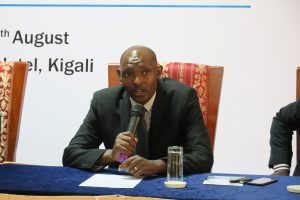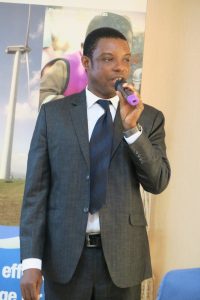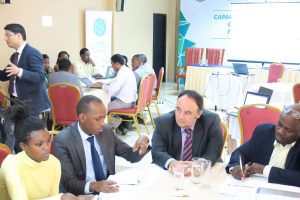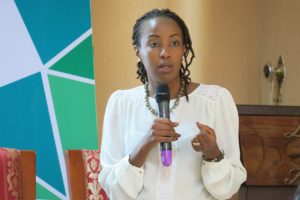Kigali, August 7-8 – The GGGI Rwanda team and Rwanda Environmental Management Authority (REMA) with support of the UNFCCC Secretariat, UNFCCC Regional Collaboration Center based in Kampala, the African Development Bank, the World Bank, and the Rwanda Environment and Climate Change Fund (FONERWA) collaborated in co-organizing a two-day capacity building training on “climate finance” for Sector Experts in Kigali, Rwanda. The training was aimed at enhancing the capacities of Rwandan Sector experts in accessing Climate Finance, explaining global, national and local finance opportunities to help strategize effectively on NDC capital raising for implementation.

Mr Faustin Munyazikwiye, DDG REMA
Mr Faustin Munyazikwiye, DDG REMA called for mainstreaming climate change in our budgets and focus on adaptation. He stressed the need to “identify the most vulnerable sector of the economy, costing the needs and working together in packaging proposals to mobilize finance”
The training brought together public and private sector experts that play a crucial role in the implementation of Nationally Determined Contributions (NDCs). More than 40 participants attended the training representing (i) Sector experts in ministries for the environment, finance and planning officers, and other relevant line ministries; (ii) Representatives of public and private entities involved in the NDC implementation; (iii) private sector entities and non-governmental bodies interested in climate finance and (iv) senior management officials from financial sectors in Rwanda. As the sector experts they are required to fully comprehend the existing financing options, access modalities and rules, diverse modes of access and funding priorities. The training provided a platform for experts to discuss different options for accessing climate finance, project identification and development of bankable projects. Participants were introduced to climate finance mechanisms including UNFCCC related funds , AfDB climate finance instruments (external funds and Bank-managed trust funds), World Bank and Multilateral and bilateral climate funds; key criteria for access to climate finance and readiness; public-private climate finance.
Climate finance is one of the most important enablers in the context of Paris Agreement and more crucial to countries vulnerable to climate change such as Rwanda. Rwanda has been experiencing climate change impacts in various parts of the country. For example, during the recent rainfall, Rwanda lost around 200 people. However, the government of Rwanda has also laid the foundation to alleviate such tragedies this includes the GGCRS developed in 2011, which highlighted FONERWA– established in 2012- as the vehicle for mobilizing climate finance. Rwanda is focusing on both mitigation and adaptation actions and building climate resilience.
Although climate finance flows are increasing, challenges still exist in accessing them and large-scale investments are required to significantly reduce emissions, adapt and build climate resilience. Furthermore this training was an opportunity to share practical experiences from other markets (especially frontier markets) and discuss the needs for Rwanda to fully access climate finance both domestic and international sources.

Mr Daniel Okey Ogbonnaya GGGI Rwanda.
Mr Okey Daniel Ogbonnaya GGGI Rwanda Acting Country Representative emphasized that “homegrown solutions should be the best approaches to help the country in its climate change mitigation and adaptation, nurturing local innovations and technologies, and packaging the information in a language that is easy to understand by stakeholders – could play a far greater role in helping the country achieve SDGs and NDCs targets.” He further highlighted how these links closely to GGGI’s strategic objectives in supporting member and partner countries to achieve their NDCs and SDGs.
Participants actively engaged in the training and identified types of risks perceived in green projects including: attracting private investment, policy changes, technological risk, lack of climate related data as baselines, and credit risks among others. The participants then recommended the most suited and successful climate finance instruments for Rwanda, such as: promoting public-private partnership to joint efforts to develop project proposals, using existing funds to support Small and Medium Enterprises and create more mechanisms to support private sector, payment for ecosystem services, tax incentives, etc.
A panel composed of GGGI Country Representative, UNFCCC Secretariat, AfDB and REMA discussed on the “importance of climate finance in meeting NDC and SDG targets and the importance of National Climate Resilience and adaptation strategies.
Participants understood why large-scale investments and significant financial resources are required to significantly reduce emissions and to adapt to the adverse effects of climate change. Financial mechanism such as Green Climate Fund (GCF) ; Global Environment Facility GEF ; Special Climate Change Fund ; Least Developed Countries Fund ; Adaptation Fund amongst others, were assessed for participants to grasp their functionality both from the applicant and reviewer perspectives. Participants deliberated on how to mobilize more climate finance in the country to meet SDG and NDC targets.

Mr. Alejandro Kilpatrick Team Lead, Climate Finance and Capacity-building Unit, Finance Technology and Capacity-building Programme at UNFCC.
UNFCC Team Lead Mr. Alejandro Kilpatrick made elaborated on the climate finance architecture that supports country-driven strategies, taking into account needs and priorities of these developing countries.
Ms. Margaret Kamau and Dr. Olufunso Somorin from AFDB illustrated how the Africa NDC Hub of partners aims to use the Hub to attract additional finance and to promote partner activities, by mentioning their goal is “to assist African countries to achieve NDC targets by 2030. AFDB activities are all aligned to the comprehensive strategic vision to enable the achievement of “low-carbon and climate-resilient’ development in Africa.”
Moving forward, participants highlighted a need of technical support adapted to the national context, establish platforms and support the existing ones to share knowledge and experience with other countries, setting up a scheme to certify green business, conducting feasibility studies and a clear business model aiming to attract private investors by showing clear returns.

Ms. Margaret Kamau, AFDB
Dr Brigitte Nyirambangutse , GGGI-IMELS Program Officer organised the training as one of the areas of cooperation in the GGGI-IMELS Agreement for capacity building and public education to promote and increased understanding of sector experts for climate finance mechanisms, instruments and tools.
This event was joint co-sponsored in collaboration with the Government of Rwanda, GGGI and IMELS (Italian Ministry for Environment, Land and Sea)